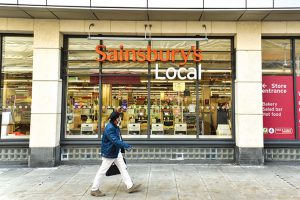J Sainsbury Plc’s profit is falling after the supermarket absorbed some of its own surging costs to limit price increases for cash-strapped consumers at a time when UK grocers are fighting to maintain market share.
Britain’s second-largest supermarket chain said retail operating profit fell 9% in the first half as it invested in key product categories to keep prices competitive in a market where rivals, such as the German discounters, are trying to win new customers.
Sainsbury’s profit was also hit by higher operating costs and lower volumes post-pandemic as people eat fewer meals at home and become more selective about what they buy.
Surging inflation is bearing down on UK consumers who are shopping around, visiting cheaper rivals and buying own-label brands to try to save money on their food bills. Sainsbury said in April that profit will fall this year as trends seen in the pandemic started to ease and consumers began to pull back on spending amid more challenging economic times.
“We’re really battling to keep our prices down,†Chief Executive Officer Simon Roberts said on a media call.
Despite the hit to profit, Sainsbury stuck to its forecast for the full year of underlying profit before tax of £630 million to £690 million. Analysts at Bernstein said the results were stronger than expected while Jefferies said they were “more resilient than feared.â€
Sainsbury said it benefited from warmer weather, particularly at Argos which recorded strong sales of “gardening tools, barbecues and outdoor toys†as a result of the UK’s hot summer.
Prices in British shops rise by the highest rate since at least 2005 last month as the cost-of-living crisis piles pressure on consumers. Food price increases hit a record 11.6% with tea bags, milk and sugar all showing significant hikes, according to the British Retail Consortium.
Shoppers are trading down. Sainsbury’s own-brand products are about half the price of branded alternatives and that’s why customers are “switching much more readily,†said Roberts. While customers are putting fewer items in their baskets, Sainsbury’s volumes are still holding up versus the competitors, he said.
Sainsbury, which controls about 15% of the UK grocery market and employs about 170,000 people, is making savings across the business so it can keep prices low. The retailer is investing more than £500 million over two years to keep prices affordable. This includes price matching discount rival Aldi on 240 products and increasing the number of own-brand items where the prices are locked for a period of time.
The grocer’s operating costs are surging with inflation. Sainsbury has increased employee pay twice this year with an investment of £150 million. It’s offering staff free food during shifts and increasing employee discounts as companies increasingly compete for labour in a tight employment market. The chain said it’s hiring 18,000 temporary staff to help during the busy Christmas period.
—Bloomberg
 The Gulf Time Newspaper One of the finest business newspapers in the UAE brought to you by our professional writers and editors.
The Gulf Time Newspaper One of the finest business newspapers in the UAE brought to you by our professional writers and editors.
